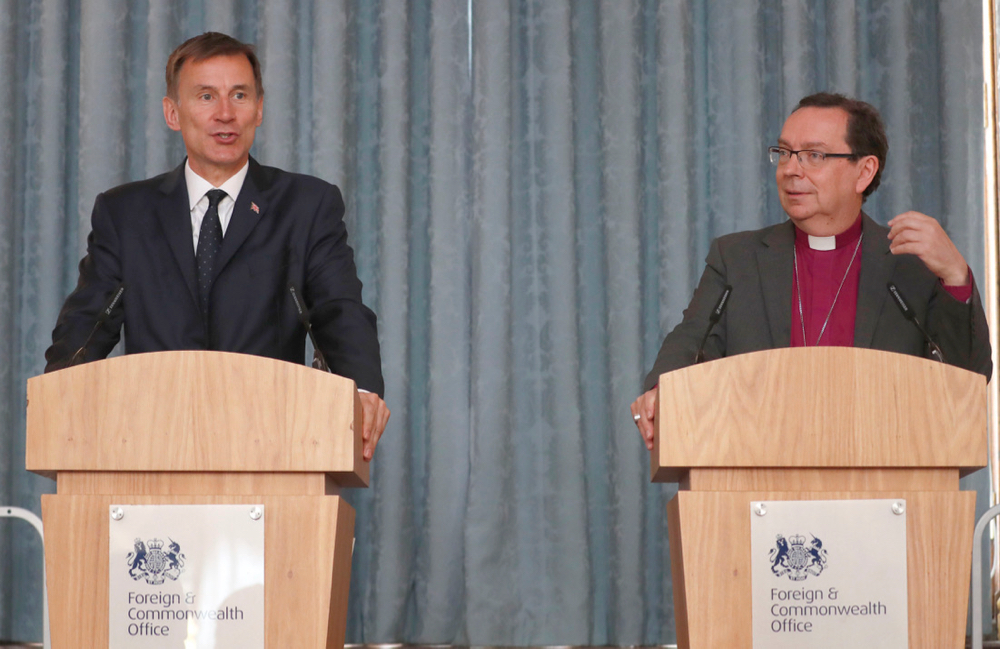The British government should consider sanctions on countries where Christians are persecuted, according an independent review for the Foreign Secretary.
The report, by the Church of England Bishop of Truro Philip Mounstephen, recommends the UK "be prepared to impose sanctions against perpetrators of Freedom of Religious Belief (FoRB) abuses."
It also recommends the government explore how social media strategies can promote religious freedom and counter religious hate, and that a standard definition of FoRB be established.
"The main impact of such genocidal acts against Christians is internal displacement and exodus. Christianity now faces the possibility of being wiped-out in parts of the Middle East where its roots go back furthest. In Palestine, Christian numbers are below 1.5 percent; in Syria the Christian population has declined from 1.7 million in 2011 to below 450,000 and in Iraq, largely through the ‘ethnic 37 cleansing’ of ancient Christian communities from the Nineveh Plains, Christian numbers have slumped from 1.5 million before 2003 to below 120,000 today. Christianity is at risk of disappearing, representing a massive setback for plurality in the region. It is that plurality which has been a key for security and stability in the region for hundreds of years."
The report urges that freedom of religious belief be mainstreamed in every region of the world and the Foreign Office should strengthen its advocacy with member states of multilateral bodies to create national FoRB Special Envoys and seek increased activity and engagement in FoRB processes as a central part of their multilateral engagement with like-minded states and others.
It also highlights "a significant cultural knowledge deficit in the awareness and practice of religion in society in the United Kingdom which witnesses have suggested is increasingly evident in the culture of the Foreign Office Network."
Given the centrality of religious belief to the vast majority of the world’s population and communities this poses a "particular challenge for British diplomats seeking to operate between these two worlds," it says.
It urges specific religious literacy training both prior to and during the course of particular roles and posts as "an integral part of the preparation and ongoing development" of Foreign Office staff.
Expert input was given by organisations such as Aid to the Church in Need, Open Doors, Release International, Christian Solidarity Worldwide and the Observatory of Religious Freedom in Latin America.
Neville Kyrke-Smith, National Director of Aid to the Church in Need (UK) said: “We at Aid to the Church in Need are pleased to have been involved in this report. It is an encouragement that these issues are being recognised at the right level. It is so important that the challenges faced by people of Christian faith and other minorities are recognised by our foreign office. We need to support Christians who are bridge builders, peace makers and negotiators.”
Mike Simpson, CEO of The Foundation for Relief and Reconciliation in the Middle East, said: “We contributed to this report, gathering evidence from the frontlines in northern Iraq. Our mission is to build peace among religious groups in this war-ravaged country. Given the severity of the violence in Iraq, particularly that suffered by the Christians, we believe the recommendations could have gone a lot further.
“Christianity is at existential risk in Iraq and other Middle Eastern countries. Since 2003, over 1 million Christians fled the country, reducing the size of the Christian population by nearly 80 per cent.
“No other religious group has seen anything approaching this level of exodus from Iraq in modern times. One might call it an exodus of Biblical proportions."



 Loading ...
Loading ...